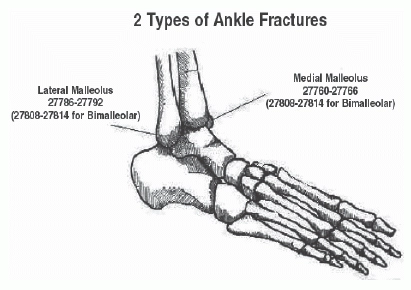Apply this open/closed concept to avoid 27786-27814 pitfalls.
Every dollar counts, and that’s why you need to be extra vigilant when it comes to understand the difference between bimalleolar and trimalleolar fracture repair codes. Miscoding these claims could cost your orthopedic practice hard-earned money.
CPT®’s index breaks down the ankle fracture codes into five types: lateral, medial, bimalleolar, trimalleolar, or posterior malleolus. Therefore, your orthopedist needs to make sure he documents the fracture repair specifics.
Important: You need to distinguish between open versus closed treatment. The term “open” implies the site of the fracture was exposed to do a surgical repair and “closed” implies that the fracture was reduced without any exploration.
Closed treatment implies that the fracture site is not surgically exposed to the external environment and directly visualized. Open treatment is used when the fractured bone is either surgically opened to visualize and fix the fracture or is opened remotely from the fracture site in order to insert an intramedullary nail across the fracture site.
Type 1: Decide if Lateral Malleolus Fracture Is Open Versus Closed
Even though CPT® directs you to the 27786-27814 series for lateral malleolus fractures, your work may not be done because orthopedists don’t always dictate “lateral malleolus fractures” in their documentation. For instance, your orthopedist may document “distal fibula” fracture instead.
Next, you need to determine which surgical method the orthopedist performed: closed or open.
Closed: For closed fracture treatment of the lateral malleolus, report either 27786 (Closed treatment of distal fibular fracture [lateral malleolus]; without manipulation) or 27788 (… with manipulation). You would report 27786 for an application of a cast, CAM walker, splint, or orthosis. On the other hand, you would use 27788 when the fracture is displaced and needs to be reduced.
Open: If the orthopedist performs open treatment, report 27792 (Open treatment of distal fibular fracture [lateral malleolus], includes internal fixation when performed). Open treatment means treatment of a fracture/dislocation by surgically exposing the fracture/dislocation site.
In some cases, physicians are treating the fracture with open reduction — actually seeing the fracture with the naked eye, not via X-ray — but they are placing the fixation percutaneously. You can still bill these as open treatment codes.
Type 2: Master Medial Malleolus Fracture Coding
Again, for medial malleolar fractures, you need to determine if the surgeon used a closed or open method.
Closed: If the orthopedist performs closed medial malleolar fracture treatment, report either 27760 (Closed treatment of medial malleolus fracture; without manipulation) or 27762 (... with manipulation, with or without skin or skeletal traction).
Open: You should report 27766 (Open treatment of medial malleolus fracture, includes internal fixation when performed) when the orthopedist uses an open method to treat the fracture, says Arnold Beresh, DPM, CPC, CSFAC, of Peninsula Foot and Ankle Specialists PLC in Hampton, Va.
New option: You may come across a physician treating medial malleolus fractures with closed manipulation and percutaneous fixation, but there is no CPT® code for this procedure. Bill this method with an unlisted procedure code (27899, Unlisted procedure, leg or ankle). Be sure to include the op note, a description of the procedure, and a letter describing a comparable established procedure.
Type 3: Look for Bimalleolar Under Two CPT® Listings
You’ll note that CPT® directs you to the 27808-27814 series in its index under both the “medial malleolus” and “lateral malleolus” listings. These codes actually represent bimalleolar fractures, which usually means the patient fractured both the lateral and medial malleoli, however it can include a fracture of either the lateral or medial malleolus with the posterior malleolus.
Closed: You should report 27808 (Closed treatment of bimalleolar ankle fracture [e.g., lateral and medial malleoli, or lateral and posterior malleoli or medial and posterior malleoli]; without manipulation) or 27810 (... with manipulation) if the orthopedist performs closed fracture care on a bimalleolar fracture.
Open: When the orthopedist uses an open surgical method to treat a bimalleolar fracture, report 27814 (Open treatment of bimalleolar ankle fracture, [e.g., lateral and medial malleoli, or lateral and posterior malleoli, or medial and posterior malleoli], includes internal fixation, when performed) with 824.4 (Fracture of ankle; bimalleolar, closed) or 824.5 (... bimalleolar, open) as the diagnosis.
Trap: If your physician sees a patient for a “bimalleolar equivalent fracture,” you may be tempted to report the bimalleolar fracture treatment codes for this injury. The AMA, however, advises you report either the lateral malleolus fracture treatment codes (27786-27792) or medial malleolus fracture treatment codes (27760-27766).
Type 4: For Trimalleolar, Examine Posterior Lip
Trimalleolar fractures involve the same components as a medial and lateral malleolar fracture as well as the posterior lip of the tibia, which is termed the posterior malleolus for the purposes of this classification.
Closed: If the orthopedist performs a closed treatment (which is rare), you would report 27816 (Closed treatment of trimalleolar ankle fracture; without manipulation) or 27818 (... with manipulation), with the diagnosis code 824.6 (Fracture of ankle; trimalleolar, closed) or 824.7 (... trimalleolar, open).
Open: You should use 27822 (Open treatment of trimalleolar ankle fracture, includes internal fixation, when performed, medial and/or lateral malleolus; without fixation of posterior lip) or 27823 (... with fixation of posterior lip) for open trimalleolar treatments.
Don’t miss: When the posterior lip does not require fixation, submit 27822. Otherwise, when the physician needs to address/fix the tibial posterior lip, you would report 27823.
Type 5: Apply 27767-27768 to Posterior Malleolus Fx
You already delved into codes covering treatment of medial malleolus fractures, but you should take into account the codes for posterior fractures.
Closed: When your orthopedist performs a closed method, you would report either 27767 (Closed treatment of posterior malleolus fracture; without manipulation) or 27768 (… with manipulation).
Open: For the open method, you should use 27769 (Open treatment of posterior malleolus fracture, includes internal fixation, when performed).

